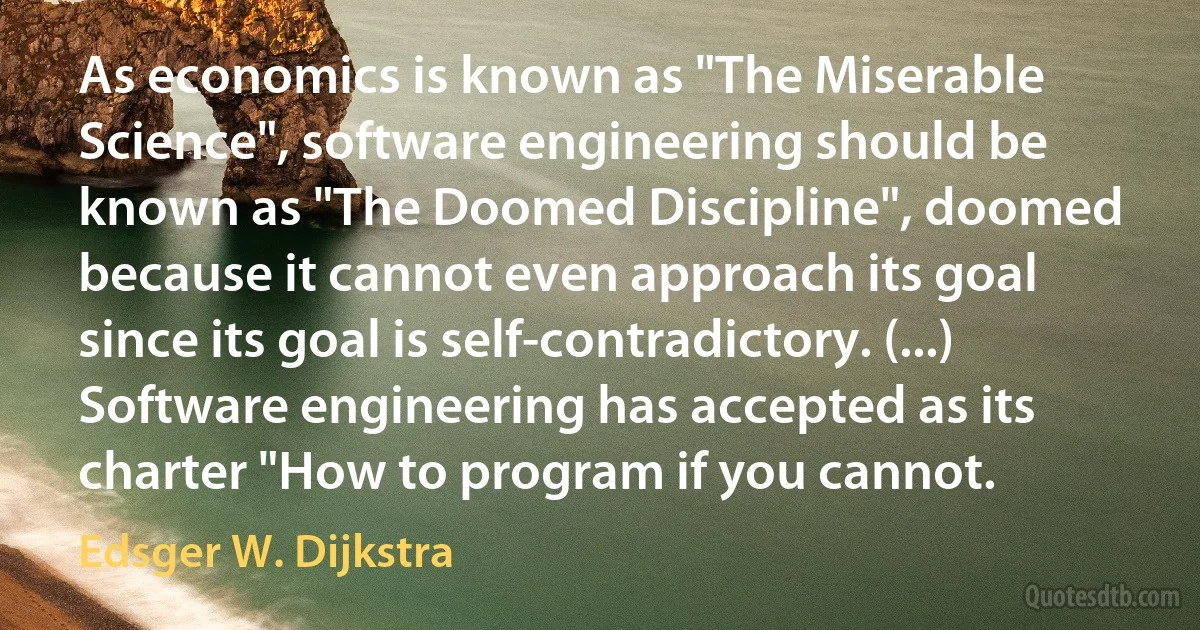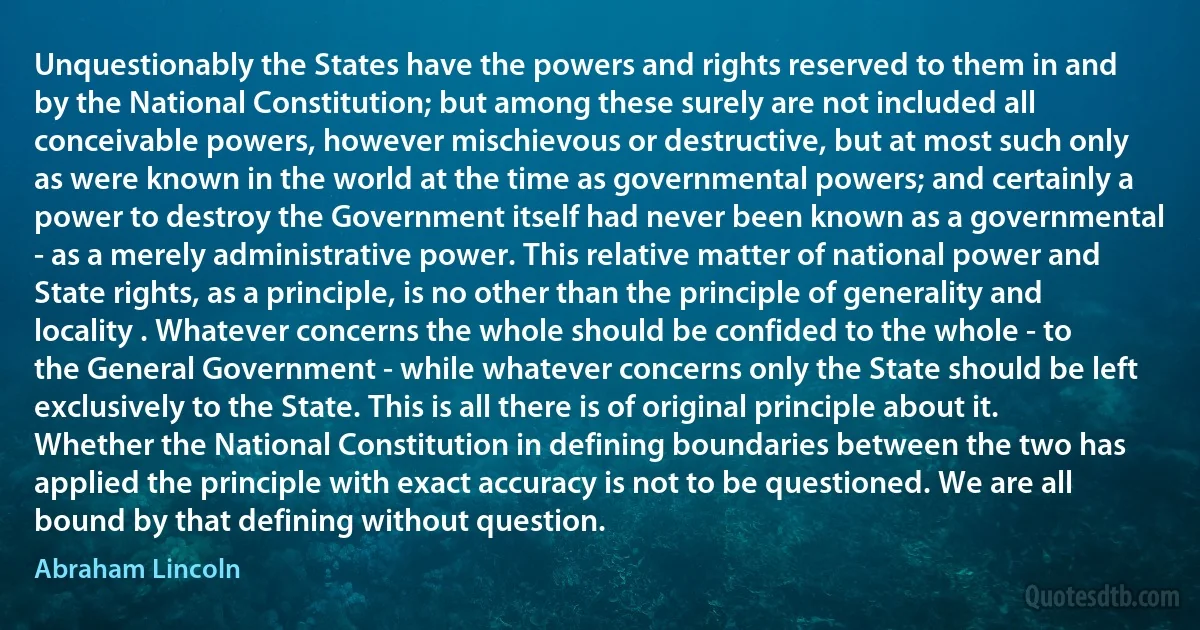Known Quotes - page 85
Novelists, playwrights, painters and others may hold in their heads the expectation of fame, but not poets. Having chosen that road, all one can dream of is the jealousy of one's rivals. Celebrity is unexpected and almost unseemly--it forces one to wear a constant look of chagrin, if that is possible. Unless you are Byron, who was the first poet to become a star. At its worst, fame means being known by strangers--enough to bring on waves of paranoia.

Billy Collins
We may assume the superiority ceteris paribus [all things being equal] of the demonstration which derives from fewer postulates or hypotheses-in short from fewer premisses; for... given that all these are equally well known, where they are fewer knowledge will be more speedily acquired, and that is a desideratum. The argument implied in our contention that demonstration from fewer assumptions is superior may be set out in universal form...

Aristotle
The premisses of demonstrative knowledge must be true, primary, immediate, more knowable than and prior to the conclusion, which is further related to them as effect to cause... The premisses must be the cause of the conclusion, more knowable than it, and prior to it; its causes, since we posses scientific knowledge of a thing only when we know its cause; prior, in order to be causes; antecedently known, this antecedent knowledge being not our mere understanding of the meaning, but knowledge of the fact as well. Now 'prior' and 'more knowable' are ambiguous terms, for there is a difference between what is prior and more knowable in the order of being and what is prior and knowable to man. I mean that objects nearer to sense are prior and more knowable to man; objects without qualification prior and more knowable are those further from sense. Now the most universal causes are furthest from sense and particular causes are nearest to sense, and they are thus exactly opposed to each other.

Aristotle
The natural way of doing this [seeking scientific knowledge or explanation of fact] is to start from the things which are more knowable and obvious to us and proceed towards those which are clearer and more knowable by nature; for the same things are not 'knowable relatively to us' and 'knowable' without qualification. So in the present inquiry we must follow this method and advance from what is more obscure by nature, but clearer to us, towards what is more clear and more knowable by nature. Now what is to us plain and obvious at first is rather confused masses, the elements and principles of which became known to us by later analysis...

Aristotle
[T]he ancient philosophers... all of them assert that the elements, and those things which are called by them principles, are contraries, though they establish them without reason, as if they were compelled to assert this by truth itself. They differ, however... that some of them assume prior, and others posterior principles; and some of them things more known according to reason, but others such as are more known according to sense: for some establish the hot and the cold, others the moist and the dry, others the odd and the even, and others strife and friendship, as the causes of generation. ...in a certain respect they assert the same things, and speak differently from each other. They assert different things... but the same things, so far as they speak analogously. For they assume principles from the same co-ordination; since, of contraries, some contain, and others are contained.

Aristotle
Perhaps then we must begin with such facts as are known to us from individual experience. It is necessary therefore that the person who is to study, with any tolerable chance of profit, the principles of nobleness and justice and politics generally, should have received a good moral training. (Bk I, Ch II)

Aristotle
There are, in fact, as I began to say above, not a few principles which are the special property of mathematics, such principles as are discovered by the common light of nature, require no demonstration, and which concern quantities primarily; then they are applied to other things, so far as the latter have something in common with quantities. Now there are more of these principles in mathematics than in the other theoretical sciences because of that very characteristic of the human understanding which seems to be such from the law of creation, that nothing can be known completely except quantities or by quantities. And so it happens that the conclusions of mathematics are most certain and indubitable.

Johannes Kepler
For a while I gave myself up entirely to the intense enjoyment of picturing machines and devising new forms. It was a mental state of happiness about as complete as I have ever known in life. ... When natural inclination develops into a passionate desire, one advances towards his goal in seven−league boots. In less than two months I evolved virtually all the types of motors and modifications of the system which are now identified with my name, and which are used under many other names all over the world. It was, perhaps, providential that the necessities of existence commanded a temporary halt to this consuming activity of the mind.

Nikola Tesla
Let us turn now to the most elementary principle of just war theory, universality. Those who cannot accept this principle should have the decency to keep silent about matters of right and wrong, or just war. If we can rise to this level, some obvious questions arise: for example, have Cuba and Nicaragua been entitled to set off bombs in Washington, New York, and Miami in self-defense against ongoing terrorist attack? Particularly so when the perpetrators are well known and act with complete impunity, sometimes in brazen defiance of the highest international authorities, so that the cases are far clearer than Afghanistan? If not, why not?

Noam Chomsky
It is known that Whistler when asked how long it took him to paint one of his "nocturnes" answered: "All of my life." With the same rigor he could have said that all of the centuries that preceded the moment when he painted were necessary. From that correct application of the law of causality it follows that the slightest event presupposes the inconceivable universe and, conversely, that the universe needs even the slightest of events.

Jorge Luis Borges
I have also cleared the electromagnetic theory of light from all unwarrantable assumption, so that we may safely determine the velocity of light by measuring the attraction between bodies kept at a given difference of potential, the value of which is known in electromagnetic measure.

James Clerk Maxwell
I, Abraham Lincoln, President of the United States, do proclaim, declare, and make known to all persons who have, directly or by implication, participated in the existing rebellion, except as hereinafter excepted, that a full pardon is hereby granted to them and each of them, with restoration of all rights of property, except as to slaves, and in property cases where rights of third parties shall have intervened, and upon the condition that every such person shall take and subscribe an oath, and thenceforward keep and maintain said oath inviolate; and which oath shall be registered for permanent preservation, and shall be of the tenor and effect following, to wit:.

Abraham Lincoln
The ambition for broad acres leads to poor farming, even with men of energy. I scarcely ever knew a mammoth farm to sustain itself; much less to return a profit upon the outlay. I have more than once known a man to spend a respectable fortune upon one; fail and leave it; and then some man of more modest aims, get a small fraction of the ground, and make a good living upon it. Mammoth farms are like tools or weapons, which are too heavy to be handled. Ere long they are thrown aside, at a great loss.

Abraham Lincoln
The spread, both in and width and depth, of the multifarious branches of knowledge by during the last hundred odd years has confronted us with a queer dilemma. We feel clearly that we are only now beginning to acquire reliable material for welding together the sum total of all that is known into a whole; but, on the other hand, it has become next to impossible for a single mind fully to command more than a small specialized portion of it. I can see no other escape from this dilemma (lest our true who aim be lost for ever) than that some of us should venture to embark on a synthesis of facts and theories, albeit with second-hand and incomplete knowledge of some of them -and at the risk of making fools of ourselves.

Erwin Schrödinger

![First then I will set out the very first theorem which became known to me by means of mechanics, namely that
Any segment of a section of a right angled cone (i.e., a parabola) is four-thirds of the triangle which has the same base and equal height,
and after this I will give each of the other theorems investigated by the same method. Then at the end of the book I will give the geometrical [proofs of the propositions]... (Archimedes)](https://cdn.quotesdtb.com/img/quotes_images_webp/24/archimedes-base-book-cone-421524.webp)

